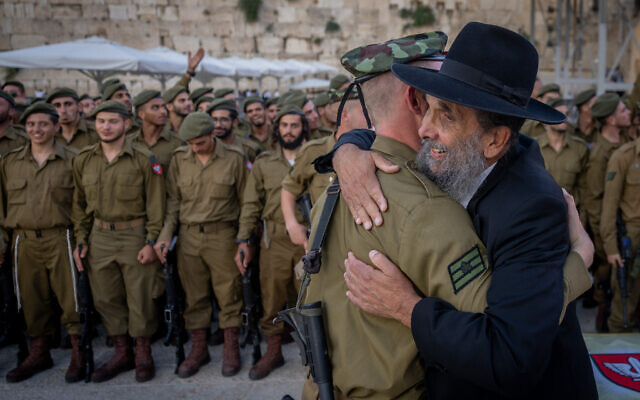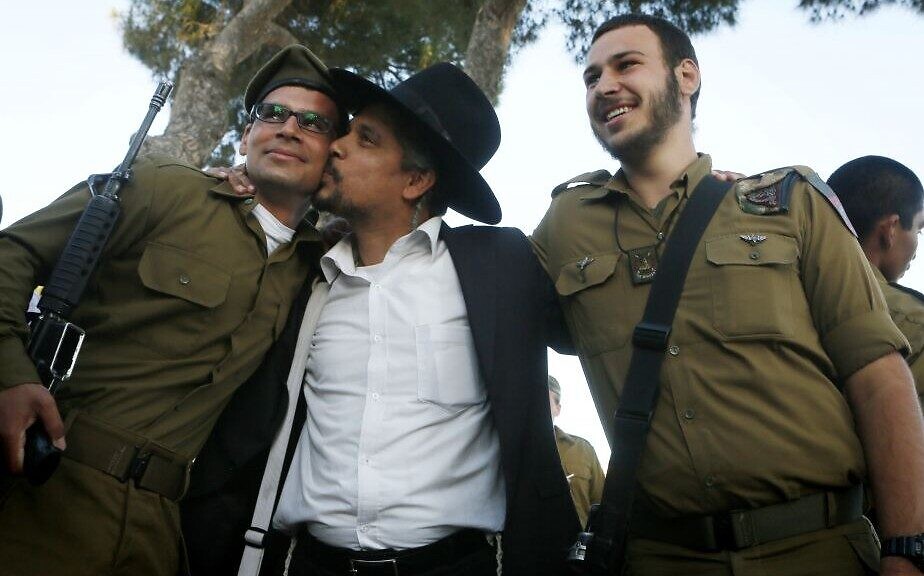 |
| Israeli soldiers from the ultra-Orthodox Netzah Yehuda Battalion attend a swearing-in ceremony at the Western Wall in Jerusalem's Old City, July 10, 2024. |
Despite overwhelmingly opposing drafting previously exempt members of their community, a majority of Israel’s ultra-Orthodox Jews believe that the establishment of additional military units geared toward accommodating their religious sensitivities would increase enlistment.
According to a Smith Consulting poll presented to the Knesset State Control Committee last week, while 72 percent of ultra-Orthodox respondents oppose mobilizing Haredim at age 18 like all other Jewish Israelis, 59% indicated — to one degree or another — that the creation of service tracks allowing them to maintain their lifestyle would have a beneficial effect on overall enlistment numbers.
The survey polled 450 Haredim on July 3-4, providing a snapshot of ultra-Orthodox public opinion in the wake of last month’s High Court of Justice ruling that there is no legal basis for exempting ultra-Orthodox men from the military draft.
The landmark judgment, which overturned decades of draft exemptions for ultra-Orthodox yeshiva students, stated explicitly that the government must “act to enforce the Law for Military Service on yeshiva students,” compelling state agencies to take active steps to draft such men into Israel Defense Forces service.
Following the decision, which was decried as an attack on Torah study by ultra-Orthodox leaders and politicians, Defense Minister Yoav Gallant announced that the military will begin the process of drafting ultra-Orthodox men next month.
According to the Defense Ministry, an “information campaign for the ultra-Orthodox population” will also be launched next month, showing the various “service paths adapted to the ultra-Orthodox in the IDF, per the recommendations of the Shkedi Committee” — which laid out how the country could effectively recruit and integrate members of the ultra-Orthodox community into the IDF.

There are currently an estimated 67,000 Haredi males who are eligible for service, although only a small percentage of them are expected to be called up this year.
Even as the overwhelming majority of those polled stated that they oppose drafting 18-year-old Haredim, 21% said that they were in favor so long as those studying full-time in yeshivas are exempted. Only 1% said that they support enlisting all 18-year-old Haredim.
These findings were significantly different from those of another poll published by the ultra-Orthodox news site Kikar HaShabbat in March, which found that 63% of Haredim believed that those who do not study full-time should enlist in the IDF during wartime.
Ultra-Orthodox men of military age have long been able to avoid being conscripted to the IDF by enrolling in yeshivas for Torah study and obtaining repeated one-year service deferrals until they reach the age of military exemption.
While some ultra-Orthodox politicians have indicated that they could see enlisting members of their community not enrolled in full-time Torah study as an acceptable compromise, senior Haredi rabbis have eschewed any accommodation following the High Court ruling.

Rabbi Moshe Maya, a senior member of the ultra-Orthodox Shas party’s Council of Torah Sages, declared that it was “forbidden [even] for those who don’t study to go to the army,” while senior rabbis affiliated with the United Torah Judaism party forbade Haredim to obey enlistment orders.
Notwithstanding this opposition, 22% of Haredim said that establishing Haredi units would increase enlistment by a small degree while 27% indicated that they believed it would boost recruitment to “a certain extent but not by much.” A further 10% said it would increase enlistment to “a large extent.”
Speaking with the Times of Israel earlier this year, UTJ lawmaker Moshe Roth argued that despite some Haredim supporting military service in principle, there has been no rise in enlistment because they are scared of becoming secularized.
The army needs to be “more open and flexible” in creating an appropriate environment for them and the expansion of units like the all-male, strictly kosher Nahal Haredi could provide an answer, he said.
However, asked if the ultra-Orthodox parties were pushing for the opening of more Haredi units, Roth replied in the negative, arguing that this is a “secondary issue” that will only be dealt with after exemptions for full-time yeshiva students are enshrined in law.
https://www.timesofisrael.com/majority-of-haredim-say-new-religious-army-units-would-boost-enlistment-poll/?utm_source=The+Daily+Edition&utm_campaign=daily-edition-2024-07-14&utm_medium=email

